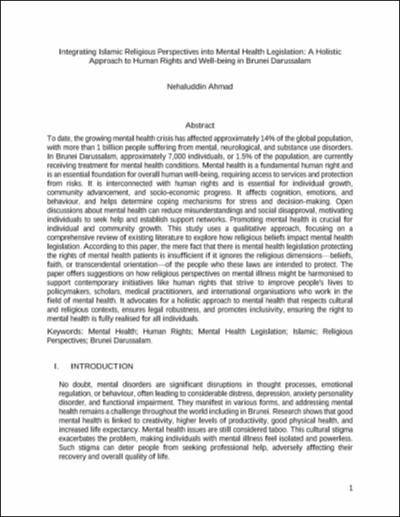Sesi 1 - Integrating Islamic Religious Perspectives into Mental Health Legislation: A Holistic Approach to Human Rights and Well-being in Brunei Darussalam

Date
01.10.2024Author
Professor Nehaluddin Ahmad
Abstract
To date, the growing mental health crisis has affected approximately 14% of the global population, with more than 1 billion people suffering from mental, neurological, and substance use disorders. In Brunei Darussalam, approximately 7,000 individuals, or 1.5% of the population, are currently receiving treatment for mental health conditions. Mental health is a fundamental human right and is an essential foundation for overall human well-being, requiring access to services and protection from risks. It is interconnected with human rights and is essential for individual growth, community advancement, and socio-economic progress. It affects cognition, emotions, and behaviour, and helps determine coping mechanisms for stress and decision-making. Open
discussions about mental health can reduce misunderstandings and social disapproval, motivating individuals to seek help and establish support networks. Promoting mental health is crucial for individual and community growth. This study uses a qualitative approach, focusing on a comprehensive review of existing literature to explore how religious beliefs impact mental health legislation. According to this paper, the mere fact that there is mental health legislation protecting the rights of mental health patients is insufficient if it ignores the religious dimensions—beliefs, faith, or transcendental orientation—of the people who these laws are intended to protect. The paper offers suggestions on how religious perspectives on mental illness might be harmonised to support contemporary initiatives like human rights that strive to improve people's lives to
policymakers, scholars, medical practitioners, and international organisations who work in the field of mental health. It advocates for a holistic approach to mental health that respects cultural and religious contexts, ensures legal robustness, and promotes inclusivity, ensuring the right to mental health is fully realised for all individuals.

